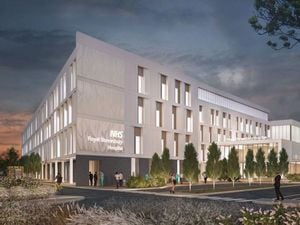MP Helen Morgan urges action on Shropshire ambulance response times in Commons debate
North Shropshire MP Helen Morgan has addressed Parliament, calling on the Government to sort out the issue of "excessive" ambulance response times in the country.

In her parliamentary debate on Thursday, Mrs Morgan highlighted the issue in the provision of emergency care across the county.
She paid tribute to the "dedicated" NHS staff in emergency departments, for their hard work in "difficult and demotivating circumstances".
The Lib Dem MP said she was not criticising hard-working NHS staff, but instead wanted to urge the Government to take action and provide support for both ambulance services and accident and emergency departments.
Speaking in the House of Commons, Mrs Morgan said that she had received a "tidal wave of correspondence" over excessive waits for an ambulance, with each story as "saddening and frightening" as the last.
The MP shared some of these stories in Parliament, mentioning: "The care home reporting a wait of 19 hours for an elderly resident with a broken hip.
"An elderly diabetic man who fell and dislocated his shoulder. He was advised not to drink or eat anything in case surgery was required, and then waited 15 hours for an ambulance to arrive.
"A disabled man who fell in his bathroom and waited for 21 hours for an ambulance – fortunately lifted from the floor after eight of these hours by a helpful neighbour."
She added: "I could easily spend the next half hour relating heart-breaking stories, and I would like to thank all my constituents who contacted me, for taking the time to describe the scale of the problem."
Although Mrs Morgan acknowledged that the problems surrounding ambulance waiting times were complex, she noted that there were consistent themes at the heart of the issue.
"The first is the problem of handing over patients at the emergency departments in Shrewsbury and Telford," she said.
"The emergency departments there are reported to suffer from a shortage of space and staff, along with the additional challenges of separating Covid patients.
"The [hospital] trust reports delays discharging patients well enough to leave hospital because of difficulties finding care home spaces or appropriate care packages.
"The impact of all of this is that because they wait so long at the hospital, ambulances begin the vast majority of their journeys from Shrewsbury and Telford, despite the fact that it’s not possible to reach the most serious patients towards the edge of the constituency within the target time.
"If the ambulance sets out from so far away, this, combined with the closure of community ambulance stations means that very few ambulances are free in towns such as Oswestry and Market Drayton when one is needed."
Mrs Morgan also highlighted other factors such as the volume of patients accessing the emergency department.
She noted Shropshire's shortage of GPs, which has led to patients having to attend the emergency departments for relatively minor reasons because they have no other option.
Mrs Morgan called on the government to deliver on its promise to recruit more GPs and urged the Health Secretary to meet her and West Midlands Ambulance Service bosses to discuss how the issue of response times can be tackled.
She also urged the Government to pass her colleague Daisy Cooper’s Ambulance Waiting Times Bill – which would require the publication of localised response time reports from ambulance services.
"Once the Government understands the complexity of the causes of the delays to ambulance service responses, they can take the correct steps, targeted at the root causes of the problem, to improve the service rapidly," said Mrs Morgan.
"As I have outlined, the causes will most likely lie in a number of areas across emergency and social care, but until they are fully understood they can not be resolved.
"Mr Speaker, the reason I brought this debate to Parliament was to ensure the Government understand the scale of the problem in Shropshire, but crucially to make sure they recognise the urgency in resolving it."





